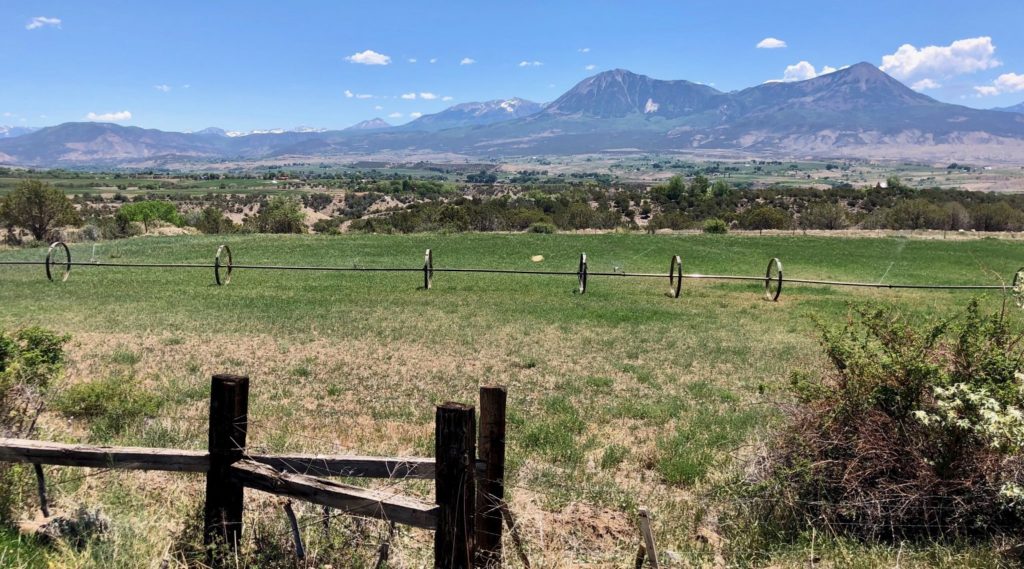Opinion: Love Justice And Climate Change – What’s A “Fair Share” And Who Should Pay It?

Western foothills of the Rocky Mountains in Colorado. Photo: Russ Vernon-Jones

President Biden told the United Nations recently that by 2024 the U.S. will provide $11.4 billion yearly in climate financing for developing nations. This is a bold, courageous, and much needed step, and at the same time woefully insufficient.
It has been widely recognized that the climate crisis can only be solved if wealthier nations assist poorer developing nations with transitioning to renewable energy and other effective climate strategies. To a large extent, right now the developing nations are following the path of the developed nations and building their economies based on fossil fuels. The majority of global greenhouse gas emissions are already coming from developing nations. Without major financial and technical assistance from the developed nations this will only get worse.
Since Emissions Anywhere Cause Climate Change Everywhere, This Is An Issue For The Whole World–Everyone, Everywhere.
I wrote a blog post on this topic last December which is still worth re-reading. This post expands upon that one with additional information and perspectives.
U.S. Financing Climate Action In Developing Nations
Clearly giving billions of dollars from the U.S. to developing nations, populated primarily with people of color, to transition to renewable energy, is not an idea the public in the United States will embrace easily. Sadly, this is true even though failure to do so will inevitably lead to drastically greater climate disaster for the whole world, including the United States.
The U.S. is not the only wealthy nation in the world that needs to participate in this type of climate subsidy for developing nations. However, it is unlikely that funding from other developed nations will be sufficient if the U.S. doesn’t contribute something approaching our fair share.
Can We Turn Away Because This Isn’t Popular?
When I’ve raised this issue with other U.S. climate activists, they have mostly said something like, “You’re right, of course, but we have a huge struggle in the U.S. just to get our own nation to net zero by 2050; we’ll never get hundreds of billions to give to other nations.” I understand this sentiment and have certainly felt it myself. On the other hand, if something absolutely must be accomplished in order to avoid the most dire results of climate change and in order to keep sufficient areas of the Earth inhabitable by humans, we can’t just turn away from it.
What Is The U.S. Fair Share?
There is no international agreement on what each developed country’s fair share is. There is some understanding that a country’s fair share should be based on how much of the climate problem that nation has caused–its responsibility–and on its ability to pay–its total wealth. Cumulatively, the U.S. has emitted more greenhouse gases than any other nation. The U.S. is also the world’s wealthiest nation. So its fair share is quite significant.
“USA Fair Shares NDC,” a 2021 report endorsed by Sunrise Movement, EcoEquity, 350.org and many others, finds that the U.S. has a legal responsibility under the Paris Agreement (2015) to provide money to assist developing nations reduce or avoid emissions (mitigation) and to protect against the future effects of climate change (adaptation). It finds that the U.S. also has a responsibility to pay developing nations for the loss and damage they suffer because of climate change. Using some quite sophisticated calculations, the report concludes that for the period 2021 – 2030 the total U.S. fair share is at least $1.6 trillion ($567 billion for mitigation, $423 billion for adaptation, and $634 billion for loss and damage). It is key, of course, that the developing nations (not the U.S.) be the ones to decide the actual projects and activities that will best address their climate issues.
Is “Fair Share” The Best Way To Frame This Issue?
So far in this post I’ve used the term “fair share,” as have many other writers on this topic. I think this notion of the U.S. paying its “fair share” may appeal to many progressives. I don’t think this term, as currently used, is a winner with the general population in the U.S. I think too many people are likely to feel that they’ve never gotten their fair share, so why should the U.S. pay to give less-developed black and brown nations a fair share.
Of course, they are correct that poor people, working people, and the middle class in the United States have not gotten their fair share over the last 40 years. The wealth of the nation developed in that time period has overwhelmingly gone to the already wealthy. While I’ve sometime said that the U.S. has gotten wealthy through burning fossil fuels, the truth is that it is the wealthy people of the U.S. who have gotten wealthy from our fossil fuel-based economy.
Another Way To Frame It
This suggests to me that we need to find a different way to frame the issue of the U.S. paying its fair share to finance climate solutions in developing nations. Let’s frame it as a matter of the wealthy people and corporations of the U.S. paying all of it. This makes sense on two counts: 1) their wealth came from an economy based on burning fossil fuels, and 2) they are the ones who can afford to pay–i.e., they are obscenely rich.
The wealthiest 10% in the U.S. have 70% of all the wealth of the country, while the bottom 50% have just 2% of the wealth. Billionaires in the U.S. have added more than $1.2 trillion to their wealth just since the pandemic began in early 2020. That amount alone would pay most of the $1.6 trillion U.S. fair share for the nine-year period 2021-2030. They could pay that amount and still be billionaires. Taxation is a legitimate way to see that they pay their fair share. (While we are at it, let’s make the top 1% pay for other things that our people need–better schools, health care, and wages and salaries, for starters.)
Next Steps For Each Of Us
I think it will be important for us to be initiating conversations with people about international climate justice and the U.S. fair share of the global effort. We need to think about how we frame this conversation so it appeals to lots of people in the U.S. Can we help people see themselves as part of a global effort to solve the climate crisis for everyone in the world and for generations into the future? Can we help them feel connected to people in the developing world, and also to allies in other wealthy nations who are advocating for climate justice? Can we get them engaged in advocating for the wealthy to pay the fair share of the wealthy nations?
I think how we frame the issue is key. I’ve made a few suggestions in this post, but I don’t think we’ve figured this out yet. How can we effectively frame this conversation and take it nationwide? I want to keep thinking and writing about this question and I’d like your help and ideas. What thoughts or musings do you have about how to talk to your neighbor or how to frame a national conversation about this? Please put your thoughts in the Comment section below.
Russ Vernon-Jones was principal of Fort River School 1990-2008 and is currently a member of the Amherst Community Safety Working Group and of the Steering Committee of Climate Action Now-Western Massachusetts. He blogs regularly on climate justice at www.russvernonjones.org.
_________________
P
